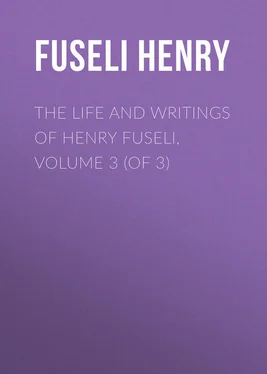Henry Fuseli - The Life and Writings of Henry Fuseli, Volume 3 (of 3)
Здесь есть возможность читать онлайн «Henry Fuseli - The Life and Writings of Henry Fuseli, Volume 3 (of 3)» — ознакомительный отрывок электронной книги совершенно бесплатно, а после прочтения отрывка купить полную версию. В некоторых случаях можно слушать аудио, скачать через торрент в формате fb2 и присутствует краткое содержание. Жанр: visual_arts, foreign_antique, foreign_prose, на английском языке. Описание произведения, (предисловие) а так же отзывы посетителей доступны на портале библиотеки ЛибКат.
- Название:The Life and Writings of Henry Fuseli, Volume 3 (of 3)
- Автор:
- Жанр:
- Год:неизвестен
- ISBN:нет данных
- Рейтинг книги:5 / 5. Голосов: 1
-
Избранное:Добавить в избранное
- Отзывы:
-
Ваша оценка:
- 100
- 1
- 2
- 3
- 4
- 5
The Life and Writings of Henry Fuseli, Volume 3 (of 3): краткое содержание, описание и аннотация
Предлагаем к чтению аннотацию, описание, краткое содержание или предисловие (зависит от того, что написал сам автор книги «The Life and Writings of Henry Fuseli, Volume 3 (of 3)»). Если вы не нашли необходимую информацию о книге — напишите в комментариях, мы постараемся отыскать её.
The Life and Writings of Henry Fuseli, Volume 3 (of 3) — читать онлайн ознакомительный отрывок
Ниже представлен текст книги, разбитый по страницам. Система сохранения места последней прочитанной страницы, позволяет с удобством читать онлайн бесплатно книгу «The Life and Writings of Henry Fuseli, Volume 3 (of 3)», без необходимости каждый раз заново искать на чём Вы остановились. Поставьте закладку, и сможете в любой момент перейти на страницу, на которой закончили чтение.
Интервал:
Закладка:
Whether human nature admitted of no more, or other causes prevented a farther evolution of powers, nothing greater did arise; Polish, Elegance, and Novelty supplied Invention: here is the period of decay; the Art gradually sunk to mediocrity, and its final reward – Indifference.
The artist and the public are ever in the strictest reciprocity: if the Arts flourished nowhere as in Greece, no other nation ever interested itself with motives so pure in their establishment and progress, or allowed them so ample a compass. As long as their march was marked with such dignity, whilst their union excited admiration, commanded attachment, and led the public, they grew, they rose; but when individually to please, the artist attempted to monopolize the interest due to Art, to abstract by novelty and to flatter the multitude, ruin followed. To prosper, the Art not only must feel itself free, it ought to reign: if it be domineered over, if it follow the dictate of Fashion or a Patron's whims, then is its dissolution at hand.
To attain the height of the Ancient was impossible for Modern Art, circumscribed by narrower limits, forced to form itself rapidly and on borrowed principles; still it owes its origin and support to nearly similar causes. During the fourteenth, and still more in the course of the fifteenth century, so much activity, so general a predilection for Art spread themselves over the greater part of Italy, that we are astonished at the farrago of various imagery produced at those periods. The artist and the Art were indeed considered as little more than craftsmen and a craft; but they were indemnified for the want of honours, by the dignity of their employment, by commissions to decorate churches, convents, and public buildings.
Let no one to whom truth and its propagation are dear, believe or maintain that Christianism was inimical to the progress of Arts, which probably nothing else could have revived. Nothing less than Christian enthusiasm could give that lasting and energetic impulse whose magic result we admire in the works that illustrate the period of Genius and their establishment. Nor is the objection that England, France, and Germany professed Christianity, built churches and convents, and yet had no Art, an objection of consequence; because it might with equal propriety be asked, why it did not appear sooner in Italy itself. The Art forms a part of social education and the ultimate polish of man, nor can it appear during the rudeness of infant societies; and as, among the Western nations, the Italians were the first who extricated themselves from the bonds of barbarism and formed asylums for industry, Art and Science kept pace with the social progress, and produced their first legitimate essays among them.
How favourably religious enthusiasm operated on Art, their sympathetic revolutions still farther prove; they flourished, they languished, they fell together. As zeal relented and public grandeur gave way to private splendour, the Arts became the hirelings of Vanity and Wealth; servile they roamed from place to place, ready to administer to the whims and wants of the best bidder: in this point of sight we can easily solve all the phænomena which occur in the history of Art, – its rise, its fall, eclipse, and re-appearance in various places, with styles as different as various tastes.
The efficient cause, therefore, why higher Art at present is sunk to such a state of inactivity and languor that it may be doubted whether it will exist much longer, is not a particular one, which private patronage, or the will of an individual, however great, can remove; but a general cause, founded on the bent, the manners, habits, modes of a nation, – and not of one nation alone, but of all who at present pretend to culture. Our age, when compared with former ages, has but little occasion for great works, and that is the reason why so few are produced: 1 1 Vel duo vel nemo – turpe et miserabile!
– the ambition, activity, and spirit of public life is shrunk to the minute detail of domestic arrangements – every thing that surrounds us tends to show us in private, is become snug, less, narrow, pretty, insignificant. We are not, perhaps, the less happy on account of all this; but from such selfish trifling to expect a system of Art built on grandeur, without a total revolution, would only be less presumptuous than insane.
What right have we to expect such a revolution in our favour?
Let us advert for a moment to the enormous difference of difficulty between forming and amending the taste of a public – between legislation and reform: either task is that of Genius; both have adherents, disciples, champions; but persecution, derision, checks will generally oppose the efforts of the latter, whilst submission, gratitude, encouragement, attend the smooth march of the former. No madness is so incurable as wilful perverseness; and when men can once, with Medea, declare that they know what is best, and approve of it, but must, or choose to follow the worst, perhaps a revolution worse to be dreaded than the disease itself, must precede the possibility of a cure. Though, as it has been observed, the fourteenth and fifteenth centuries granted to the artists little more than the attention due to ingenious craftsmen; they were, from the object of their occupations and the taste of their employers, the legitimate precursors of M. Agnolo and Raffaello, who did no more than raise their style to the sublimity and pathos of the subject. These trod with loftier gait and bolder strides a path, on which the former had sometimes stumbled, often crept, but always advanced: the public and the artist went hand in hand – but on what spot of Europe can the young artist of our day be placed to meet with circumstances equally favourable? Arm him, if you please, with the epic and dramatic powers of M. Agnolo and Raffaello, where are the religious and civic establishments, where the temples and halls open to receive, where the public prepared to call them forth, to stimulate, to reward them?
Idle complaints! I hear a thousand voices reply! You accuse the public of apathy for the Arts, while public and private exhibitions tread on each other's heels, panorama opens on panorama, and the splendour of galleries dazzles the wearied eye, and the ear is stunned with the incessant stroke of the sculptor's hammer, and our temples narrowed by crowds of monuments shouldering each other to perpetuate the memory of Statesmen who deluded, or of Heroes who bled at a Nation's call! Look round all Europe – revolve the page of history from Osymandias to Pericles, from Pericles to Constantine – and say what age, what race stretched forth a stronger arm to raise the drooping genius of Art? Is it the public's fault if encouragement is turned into a job, and dispatch and quantity have supplanted excellence and quality, as objects of the artist's emulation? – And do you think that accidental and temporary encouragement can invalidate charges founded on permanent causes? What blew up the Art, will in its own surcease terminate its success. Art is not ephemeral; Religion and Liberty had for ages prepared what Religion and Liberty were to establish among the ancients: the germ of the Olympian Jupiter, and the Minerva of Phidias, lay in the Gods of Aëgina, and that of Theseus, Hercules, and Alcibiades in the blocks of Harmodios and Aristogiton.
If the revolution of a neighbouring nation emancipated the people from the yoke of superstition, it has perhaps precipitated them to irreligion. He who has no visible object of worship is indifferent about modes, and rites, and places; and unless some great civil provisional establishment replaces the means furnished by the former system, the Arts of France, should they disdain to become the minions and handmaids of fashion, may soon find that the only public occupation left for them will be a representation of themselves, deploring their new-acquired advantages. By a great establishment, I mean one that will employ the living artists, raise among them a spirit of emulation dignified by the objects of their occupation, and inspire the public with that spirit; not an ostentatious display of ancient and modern treasures of genius, accumulated by the hand of conquest or of rapine. To plunder the earth was a Roman principle, and it is not perhaps matter of lamentation that Modern Rome, by a retaliation of her own principle, is made to pay the debt contracted with mankind. But let none fondly believe that the importation of Greek and Italian works of Art is an importation of Greek and Italian genius, taste, establishments and means of encouragement; without transplanting and disseminating these, the gorgeous accumulation of technic monuments is no more than a dead capital, and, instead of a benefit, a check on living Art.
Читать дальшеИнтервал:
Закладка:
Похожие книги на «The Life and Writings of Henry Fuseli, Volume 3 (of 3)»
Представляем Вашему вниманию похожие книги на «The Life and Writings of Henry Fuseli, Volume 3 (of 3)» списком для выбора. Мы отобрали схожую по названию и смыслу литературу в надежде предоставить читателям больше вариантов отыскать новые, интересные, ещё непрочитанные произведения.
Обсуждение, отзывы о книге «The Life and Writings of Henry Fuseli, Volume 3 (of 3)» и просто собственные мнения читателей. Оставьте ваши комментарии, напишите, что Вы думаете о произведении, его смысле или главных героях. Укажите что конкретно понравилось, а что нет, и почему Вы так считаете.












